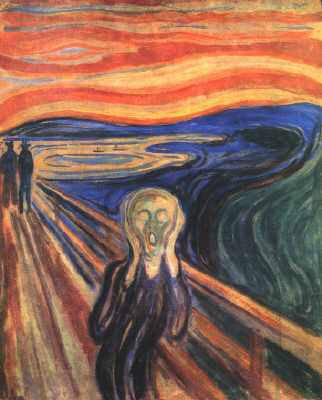


Turn-of-the-century hopes and fears found expression in the arts and literature of many periods in history, from antiquity to the modern time. Its nineteenth-century version known as fin de siècle was international and deeply influenced by changes in society. At the beginning of the twentieth century, what we now call the "turn of the century" was described as La Belle Époque. Disaster and beauty, progress and disruption: these are just a few terms used by historians to describe that period of time. The course will explore the major cultural and social developments that took place in Europe at the end of the nineteenth and the beginning of the twentieth century. Since this is a three credit-hour course, it is impossible to cover everything. We will focus on developments that took place in France, Austria-Hungary, and Germany. Special emphasis will be given to the social, political and cultural life and to the role of arts and culture in shaping the political environment at the end of the nineteenth century. We will also examine gender roles in modern society and how advances in science and technology changed the social and cultural environment. COURSE DESCRIPTION
TEXTBOOKS
NOTE: It is essential that you read the assigned sections in the textbook(s) at the time they are due. Class meetings will be organized around a lecture/discussion format and quizzes will necessitate familiarity with the material.
- Debora L. Silverman. Art Nouveau in Fin de Siecle France. Politics, Psychology, and Style. Berkeley, etc.: University of California Press, 1992 [hereafter Silverman]
- Carl E. Schorske. Fin de Siècle Vienna. Politics and Culture. New York: Vintage Books, 1981 [hereafter Schorske]
- Coursepack [hereafter Society and Culture in Fin-de-Siècle Europe]
ASSIGNMENTS
You are responsible for attending all lectures and reading the required texts. Class participation will be taken into account to determine the overall grade. The basis for evaluation of performance will be four quizzes and two exams (Midterm and Final). The unannounced quizzes will consist of multiple-choice questions and short essay questions from the lectures and the assigned readings. The Midterm and Final exams will cover everything from lectures and readings. Both will consist of a short answer section and a longer essay. A careful study of the readings is necessary for good performance. Make-up for Midterm and Final exam will be given only for very serious reasons. There is no make-up for quizzes. Extra credit work will be accepted only for students with active participation in class discussions. The format of the extra credit option shall be discussed with the instructor during regular office hours. The following point system will be used in determining the final grade:Quizzes: 40 points
Midterm: 30 points
Final exam: 30 points
Total: 100 pointsGrades:
Points Grade 94-100 A 90-93 B+ 84-89 B 80-83 C+ 74-79 C 70-73 D+ 64-69 D under 64 E
Week 1 (8/24, 26):
Introduction.
Fin de Siecle Phenomenon
Degeneration
Read: Society and Culture
in Fin-de-Siècle Europe (Part III), 781-821
Week 2 (8/31, 9/2):
The Belle Époque
Read: Society and Culture
in Fin-de-Siècle Europe(Part III), 823-952
Week 3 (9/7, 9):
France:
The Third Republic
Aristocratic Ralliement and Social Solidarite
The Catholic Church and the Third Republic
Catholics and state employment
Read: Society and Culture
in Fin de Siècle Europe (Part I), 1-13, 15-48, 49-86
Silverman,
43-62
Week 4 (9/14, 16):
Depopulation and motherhood in fin-de-siècle France
Amazone,
femme
nouvelle, and the threat to the bourgeois family
Read: Society and Culture in
Fin de Siècle Europe (Part I), 131-150
Silverman,
63-74
Week 5 (9/21, 23):
Nationalism as a driving force in the French political and cultural life
Read: Society and Culture
in Fin de Siècle Europe (Part I), 301-312
Society and
Culture in Fin de Siècle Europe (Part II), 315-370
Week 6 (9/28, 30):
The Psychologie Nouvelle
Third-Republic
Art Nouveau
Read: Silverman, 75-106,
109-185
Week 7 (10/5, 7):
More on Third-Republic Art Nouveau
Organicizing and feminizing the Crafts
Art Nouveau and the Salons
Emille Gallé and Auguste Rodin
Read: Silverman, 186-269
Week 8 (10/12, 14):
The Republican style from national initiative to international awakening
Read:Silverman, 270-314
Society and
Culture in Fin de Siècle Europe (Part I), 181-219
Week 9 (10/19, 21):
Germany:
modernity and the building of Nation
Taste and the art market in fin-de-siècle Germany
Nationalism and the Arts
Midterm
(R 10/21)
Read: Society and Culture in
Fin de Siècle Europe (Part II), 449-490
Week 10 (10/26, 28):
The crisis of modernity in the second German Empire( 1877-1902)
Art, culture and the educational reform in Wilhelmine Germany
Read: Society and Culture in Fin de Siècle Europe(Part II), 495-553
Week 11 (11/2, 4):
Rilke and the visual arts in the 1900s
The Alien Element in the German Art
The
German city in the 1900s
Read: Society and Culture in Fin de Siècle Europe (Part II), 553-600
Week 12 (11/ 9, 11):
Fin-de-siècle Vienna: politics and psyche
The Ringstrasse and the birth of modernism in Austria
Read: Schorske, 3-110
Society and
Culture in Fin de Siècle Europe (Part II), 371-379
Week 13 (11/16, 18):
Politics in fin-de-siècle Austria-Hungary
Freud's impact on political and cultural life in fin-de-siècle
Vienna
Read: Schorske, 116-203
Week 14 (11/ 23, 30):
Gustav Klimt and the Secession movement
Read: Society and Culture
in Fin de Siècle Europe (Part II), 381-448
Schorske,
208-273
Week 15 (12/ 2, 7):
Secession movement (part II)
Budapest - the other capital city around 1900s
Read: Society and
Culture
in Fin de Siècle Europe (Part III), 641-650; 653-672
Friday, December 17: Final Exam (10:00 - 12:00)